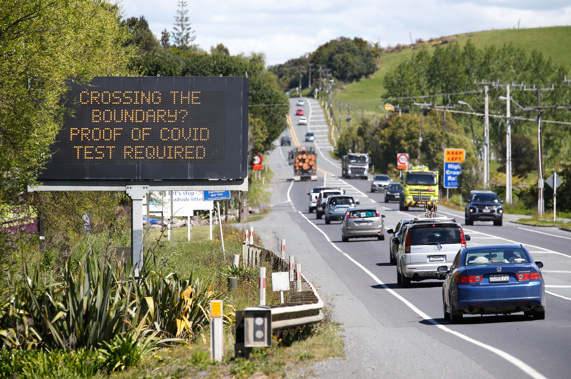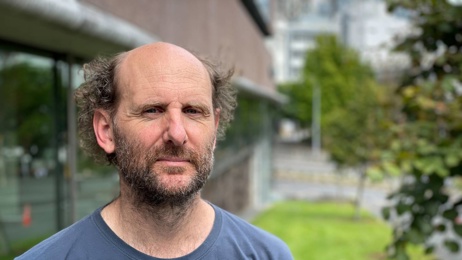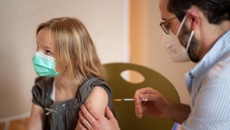
COVID LATEST:
* Covid-19: The maps that reveal vax rollout's hidden picture
* Delta outbreak: A new case high as 'clock ticking' for Christmas
* Tauranga could have cases this week, health board says
* The tech industry's problem with the Vaccine Pass
Prime Minister Jacinda Ardern has clarified that 'Freedom Day' will not be November 29 – that is the day Cabinet will decide the date – but she expects it to be "very soon after".
Ardern said she did not believe there was confusion about the date, as she had said Cabinet planned to announce when new freedoms would kick in. That date would be announced on November 29, she told The AM Show today.
The Government is expected to set out when and how Auckland's boundaries will reopen this week, and one option on the table is closing off lower-vaccinated areas or opening them only to the vaccinated.
Cabinet will today be deciding when and what measures will be needed for Aucklanders leaving the city for summer, as well as signing off on decisions on the boosters rollout and on Waikato's alert level.
The announcement on Auckland's boundary is not expected until later in the week.
It is understood Cabinet ministers have been consulting with civic, business and iwi leaders in regions such as Northland and Tairāwhiti about reopening Auckland's boundaries without putting people in those lower vaccinated areas at too much risk.
One option under consideration is dropping Auckland's boundary and instead setting up boundaries around those low-vaccinated regions - a step that could mean entry to those areas would be blocked or restricted to vaccinated people only.
One source told the Herald the discussions mainly centred around practical measures to reduce the risk, and the practicalities of running hard borders around those areas.
Measures that might be needed to leave Auckland include pre-departure tests and vaccination certificates.
The Government is also considering how to manage any problems the summer movement of Aucklanders would create – such as traffic jams at the boundaries for vaccination certificate checks, and the extra workload on testing staff and laboratories already under strain as the outbreak grows.
The decision is not likely to be announced until later in the week, but Prime Minister Jacinda Ardern has said allowing Aucklanders to leave the city for summer is a "bottom line" for the Government.
Today, Ardern is expected to announce when people will be offered vaccination boosters, after getting advice from director-general of health Dr Ashley Bloomfield last week.
That is likely to be a minimum period after which people can get a booster shot, rather than a set point at which the boosters are given.
It has now been more than eight months since the first border workers – and Covid-19 Minister Chris Hipkins - got vaccinated, and international studies have shown the effectiveness of Pfizer starts to decline after a period of time. So far only those with serious immunity disorders have been offered a third shot.
The alert level settings for Waikato will also be reviewed today, including whether to move those parts of the region in lockdown to alert level 3.3 - a step that allows hospitality to reopen with limited numbers and spacing limits.
More help for home iso
Medical Director of The Royal New Zealand College of General Practitioners, Dr Bryan Betty, says more needs to be done for people infected with Covid-19 and isolating at home.
Speaking to TVNZ's Breakfast, he said more needs to be done to check on people isolating at home. That is currently being done by public health officials, but they are under a lot of pressure, he said.
"This situation has developed very rapidly."
He said the majority of people with Covid have mild to moderate symptoms. But what officials were keeping an eye on was people whose conditions rapidly deteriorated.
"We need enough staff up front to do initial assessments as to whether the patient can be managed at home or do need something more intensive, such as hospital."
He said there needs to be clear liaison with a patient's family doctor as well as their GP clinic. In some cases, that had not happened, Betty said.
At some point, Covid will be throughout the country, he said.
"We have to accept that."
One thing he acknowledged was a positive aspect for other parts of the country was the lessons they were learning from the situation in Auckland.
Another record high
Auckland will stay at level 3.2 for at least another week while the impact of last week's decision to allow retail to reopen is tested, as well as the reopening of schools from this Wednesday.
Today also marks the deadline by which workers in the education, health and disability sectors had to have the first dose of the Covid-19 vaccine under the mandates that apply to their sectors.
The consideration of reopening Auckland for summer comes after a new record high number of 207 new community cases yesterday, and other cases in more regions of the North Island.
That include the first two community cases in Rotorua, and two cases in the Tararua district.
Yesterday also delivered the bad news that a woman in her 90s with Covid-19 had died. The woman was one of the 25 cases in the Edmonton Rest Home, and the Ministry of Health said underlying conditions meant that ventilation and ICU level care were not appropriate.
Of the 207 new cases, 192 were in Auckland, seven in Waikato, two in Northland, four in the Lakes district, and two in MidCentral.
There were 90 people in hospital, including seven in an intensive care or high-dependency unit.
Of those 90, 50 were unvaccinated or ineligible, nine were partially vaccinated for less than 14 days and another 14 were partially vaccinated for more than 14 days.
Sunday also marked the change to shorter MIQ stays for travellers - about 2400 left MIQ yesterday - eight times as many people as usual.
For most travellers, the required time in MIQ has now halved from 14 days to 7, followed by self-isolation until a negative "day 9" test is received.
The decision on Auckland's boundaries could prove contentious and is separate to the decision on when Auckland will move to the traffic lights system, which will allow more businesses to open.
Act leader David Seymour said certainty for summer was needed as soon as possible, and barring people from visiting lower vaccinated areas was preferable to keeping Auckland closed up.
"They are better to isolate the problem areas with low rates than leave the rest of us with uncertainty if pretty much every other region will be ready to go."
ON Q+A, Judith Collins said there was no reason for the boundary to stay in place after December 1, provided the Government stood up the vaccine certificate system, rapid testing, and readied the health sector.
"It seems to us if we get the rates we are talking about – 85 to 90 per cent vaccination rates – there is no reason Auckland shouldn't be able to leave the city."
Ardern has now also raised the possibility that the whole country could move to the traffic lights system when Auckland does, regardless of whether all DHBs were at 90 per cent.
Auckland is set to hit the 90 per cent double vaccinated mark this month, and Ardern has said it will move to the traffic lights system when that happens – a decision is likely on
Take your Radio, Podcasts and Music with you









